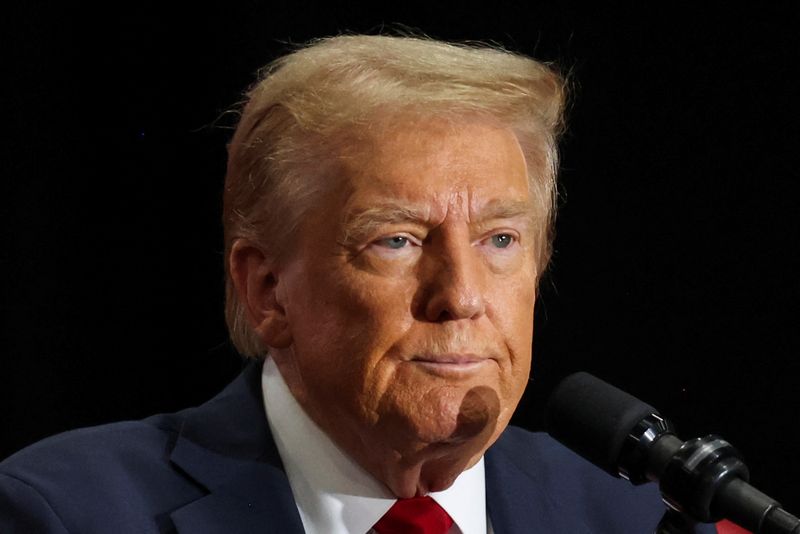Factbox-How Trump could overhaul US financial regulators if he wins on Nov. 5
2024.10.10 00:15
By Michelle Price
WASHINGTON (Reuters) – If Republican former President Donald Trump wins the U.S. election on Nov. 5 he is expected to swiftly overhaul the country’s financial regulators, which under Democratic President Joe Biden have pursued a slew of stringent new rules for banks, private funds and other lenders. Here’s how Trump could take control of the agencies upon taking office on Jan. 20, 2025.
US SECURITIES AND EXCHANGE COMMISSION CHAIR GARY GENSLER
Trump has said he’ll fire SEC chair Gary Gensler on day one. While most legal scholars agree the president does not have the power to fire the SEC chair outright, the president can replace the chair with another commissioner who can serve in an acting capacity until the Senate confirms a permanent replacement.
In Trump’s case, that would most likely be one of the two Republican commissioners, Hester Peirce or Mark Uyeda. Gensler could continue on as a commissioner until his term ends in 2026, although that would be highly unusual.
COMMODITY FUTURES TRADING COMMISSION CHAIR ROSTIN BEHNAM
Similarly, the law does not say explicitly whether the president has the power to remove the CFTC chair, according to the Government Accountability Office. But Trump would have the power to replace CFTC chair Rostin Behnam with another CFTC commissioner, which would likely be either Republican CFTC commissioner Summer Mersinger or Caroline Pham.
CONSUMER FINANCIAL PROTECTION BUREAU
In 2020, the U.S. Supreme Court handed the president more authority over the Consumer Financial Protection Bureau, including by empowering him or her to fire its director at will.
Trump is expected to remove Director Rohit Chopra on day one, but the question of who can serve as acting director has historically been contentious. The Trump administration in 2017 asserted that it had the power under the 1998 Federal Vacancies Act to install an acting CFPB director, while the agency’s deputy director at the time, Leandra English, argued that under the 2010 Dodd-Frank law which created the agency she was its rightful interim director.
The extraordinary dispute went to court and the a federal judge in Washington sided with the Trump administration. The appeals court did not adjudicate the case.
CFPB experts believe Trump could successfully cite both the circuit court ruling and the 2020 U.S. Supreme Court decision in asserting his right to appoint the interim director.
ACTING COMPTROLLER OF THE CURRENCY MICHAEL HSU
Trump would have the power to immediately replace Acting Comptroller of the Currency Michael Hsu, the national bank regulator, with another acting comptroller. That person could run the agency, potentially for years, until the Senate confirms a comptroller.
FEDERAL DEPOSIT INSURANCE CORPORATION
The FDIC situation is more complex. Following a sexual harassment scandal at the agency, Democratic FDIC chair Martin Gruenberg has said he’ll step down once Congress confirms his replacement. But with the Senate dragging its feet on the confirmation of Democratic Biden nominee Christy Goldsmith Romero, it remains unclear when that would be.
The question of whether the president can only remove the FDIC chair for cause is an open one, according to legal experts, although some Republican lawmakers have argued that Biden could have fired Gruenberg based on leadership failings identified by an independent probe into the scandal. It said multiple FDIC employees reported Gruenberg was prone to losing his temper and had an “aggressive” managerial style.
Gruenberg has said he never recalled acting inappropriately and has vowed to implement that report’s recommendations to improve the FDIC’s culture.
Regardless of who is chair in January, by replacing Chopra and Hsu, the other two Democrats on the five-member FDIC board, Trump could hand control of the agency to Republicans. The board’s Republican majority could block rulemakings brought by the chair and force votes on other issues the chair may oppose.
Democrats pulled a similar move in 2021, when they went around then Trump-appointed chair Jelena McWilliams and voted through a bank merger policy review despite her protests.
U.S. FEDERAL RESERVE VICE CHAIR FOR SUPERVISION MICHAEL BARR

The president can only fire Fed governors for cause, meaning Barr could stay in his role as the central bank’s regulatory chief until his term expires in July 2026.
But by replacing Hsu and packing the FDIC board, Trump could gain control of a large proportion of the bank regulatory agenda, and block any Fed projects that the central bank has to work on with the other two agencies. That could include the contentious Basel Endgame capital hikes, plans to require regional banks to issue more long-term debt, and new requirements ensuring banks have enough liquidity during times of stress.








